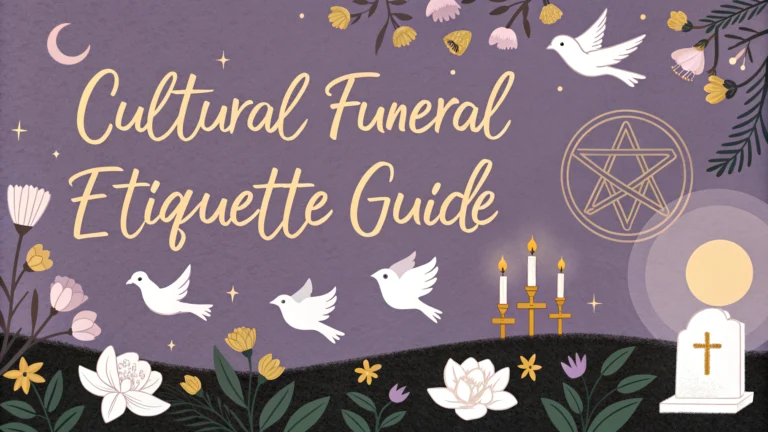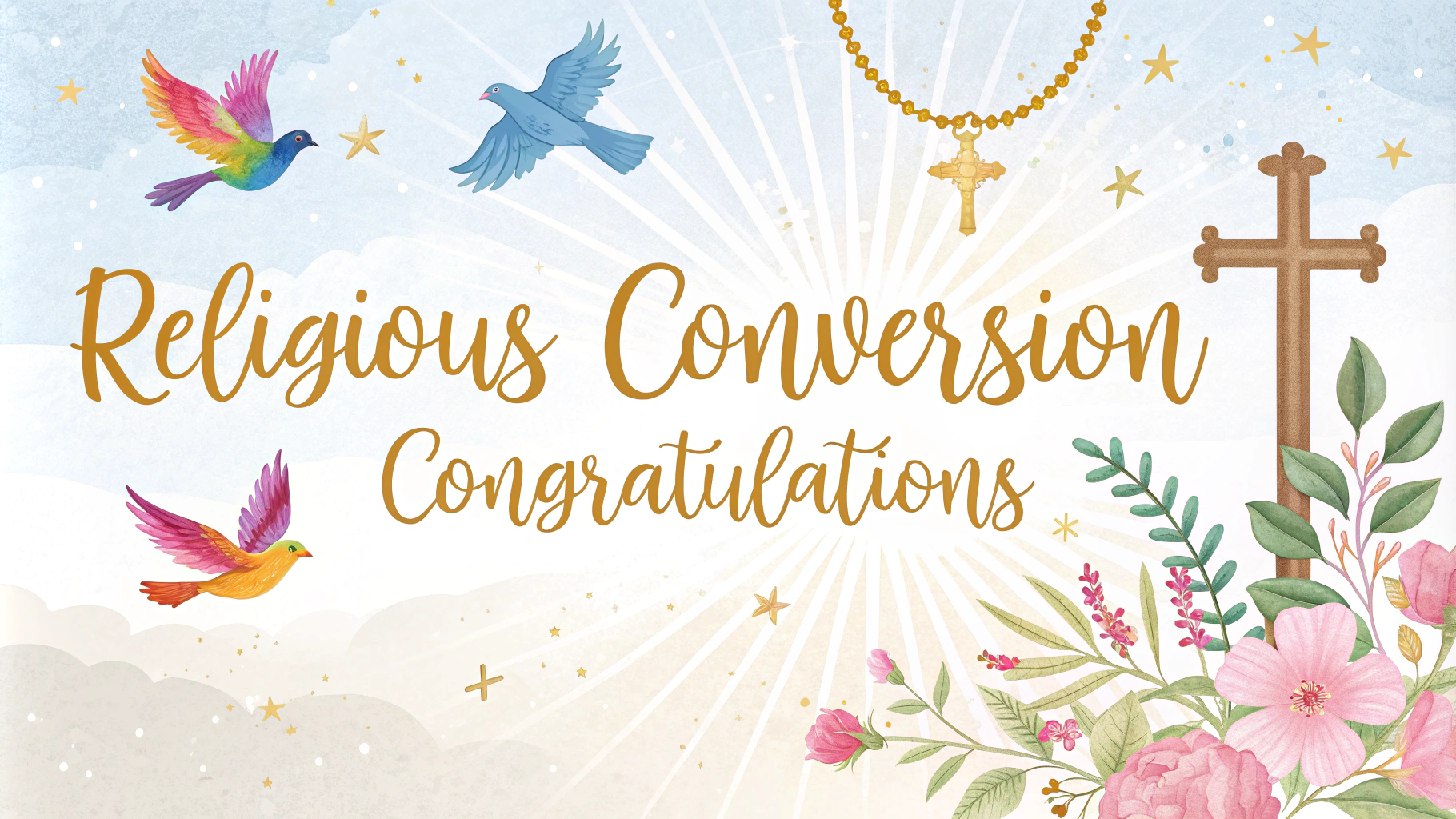Understanding funeral etiquette across different cultures helps show respect and support during difficult times.
General Funeral Etiquette Guidelines
Arrive 10-15 minutes early to any funeral service.
Switch phones to silent mode before entering the service venue.
Sign the guest book if one is provided, including your full name and relationship to the deceased.
Cultural-Specific Funeral Customs
Jewish Funerals
- Men should wear a yarmulke (head covering)
- Flowers are not traditionally sent
- Charitable donations (tzedakah) are preferred
Hindu Funerals
- White is the traditional mourning color
- Remove shoes before entering the venue
- Food offerings are welcome for the family
Muslim Funerals
- Gender segregation is common
- Modest dress is required
- Prayers are performed facing Mecca
Appropriate Condolence Messages
“May their memory be a blessing” is appropriate for Jewish mourners.
“إِنَّا لِلَّٰهِ وَإِنَّا إِلَيْهِ رَاجِعُونَ” (Inna lillahi wa inna ilayhi raji’un) is customary for Muslim mourners.
“Om Shanti” is suitable for Hindu families.
What to Bring or Send
| Culture | Appropriate Gifts |
|---|---|
| Christian | Flowers, food, sympathy cards |
| Jewish | Food baskets (kosher), charitable donations |
| Buddhist | White flowers, food offerings |
Dress Code Guidelines
- Western: Dark, conservative clothing
- Hindu: White or light colors
- Buddhist: White clothing, no red
- Muslim: Conservative dress, women should cover their heads
After the Service
Accept invitations to post-funeral gatherings if extended, as these are important parts of the grieving process.
Follow up with the family after a few weeks with a card or call.
Online Funeral Etiquette
- Mute your microphone during virtual services
- Dress appropriately even when attending remotely
- Send digital condolences through official channels only
Contact your local cultural centers or religious institutions for specific guidance about funeral customs in your area.
Duration of Mourning Periods
Traditional Timeframes
- Jewish: Shiva (7 days), Shloshim (30 days), Year of Mourning
- Muslim: 3 days formal mourning, 40 days for spouse
- Hindu: 13 days traditional period
- Buddhist: 49 days of ceremonies
Memorial Ceremonies
Different cultures observe various memorial dates throughout the year:
- Yahrzeit (Jewish) – annual remembrance
- Qingming Festival (Chinese) – annual tomb sweeping
- All Souls’ Day (Catholic) – November 2nd
Supporting Grieving Families
- Offer specific help rather than general statements
- Respect cultural mourning customs
- Maintain contact beyond the initial period
- Share memories of the deceased when appropriate
Special Considerations
Children at Funerals
- Follow family preferences
- Prepare children appropriately
- Provide support and explanations
Photography and Social Media
- Ask permission before taking photos
- Avoid posting ceremony details without consent
- Respect privacy of grieving families
Conclusion
Funeral customs vary significantly across cultures, but respect, empathy, and support remain universal. Understanding and following appropriate etiquette helps create a supportive environment for grieving families. When in doubt, ask funeral organizers or religious leaders for guidance.
Remember that grief has no timeline, and continued support beyond the funeral service is valuable. Being culturally sensitive while offering sincere condolences helps communities heal together during difficult times.
FAQs
- What are appropriate condolence phrases to say at a funeral?
Common appropriate phrases include “I’m sorry for your loss,” “My deepest condolences,” “My thoughts are with you,” or simply “I’m here for you.” Avoid phrases like “They’re in a better place” or “Everything happens for a reason.” - What is appropriate funeral attire across different cultures?
Western cultures typically wear black formal attire. In Chinese culture, white, yellow, and red are traditional mourning colors. In Hindu funerals, white is customary. Muslim funerals expect modest dress. Some African cultures wear bright colors to celebrate life. - Should I bring flowers to a funeral service?
While flowers are appropriate for many Christian funerals, they are not appropriate for Jewish or Muslim services. Some families request charitable donations in lieu of flowers. Always check the funeral announcement or ask family members about preferences. - When is it appropriate to visit the bereaved family?
In many cultures, it’s appropriate to visit during the wake or viewing hours before the funeral. Jewish traditions observe shiva for seven days after burial. Muslim families often receive visitors for three days after the funeral. - How long should I stay at a funeral service?
Typically, attend the entire service if possible, which usually lasts 30-60 minutes. For viewings or wakes, 15-20 minutes is generally sufficient unless you’re close family or friends. - Is it acceptable to take photographs at a funeral?
Generally, taking photographs at funerals is considered disrespectful unless specifically requested by the family. Some cultures may have specific ceremonies where photography is permitted with family permission. - Should children attend funerals?
This depends on cultural norms and family preferences. Many experts suggest that children old enough to understand death (usually age 7+) should be given the choice to attend if they wish to say goodbye. - What are appropriate sympathy gifts across different cultures?
Food is universally appreciated. For Jewish mourners, fruit baskets or kosher food are appropriate. In Chinese culture, white envelopes with money (avoiding amounts with the number 4) are traditional. Memorial donations are often welcome in Western cultures. - Is it appropriate to express condolences on social media?
While posting on social media has become more common, it’s best to first express condolences privately to immediate family through traditional means (in person, card, or private message) before making public posts. - How should one act during different religious funeral services?
Follow the lead of other attendees. In Christian services, participate in standing/sitting as others do. In Muslim services, remove shoes when entering the mosque. In Jewish services, men should wear head coverings. When unsure, observe and mirror respectful behavior.







